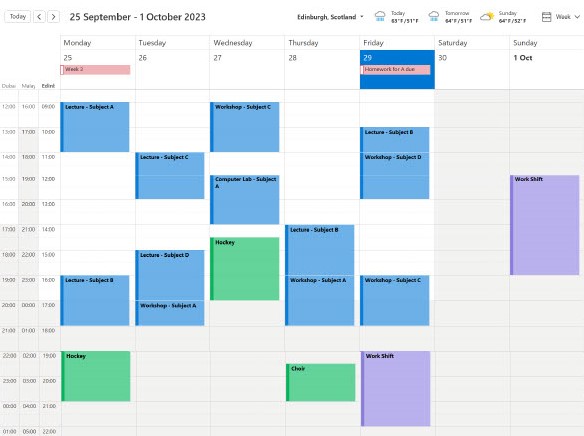Chapter 2 Be Organised

Figure 2.1: A sample of keeping time using an online calendar.
Good habits and planning
It is important that regular habits be established quickly and adhered to as far as possible. Naturally, different courses occupy different amounts of time, however these differences should not get out of proportion.
Experiment and find out what times of the day suit you best for studying, given the constraints of your timetable and any other commitments. It can be helpful to enter your class schedule and other commitments such as work, societies/sports clubs into a calendar; digital calendars are useful so that you can access and update it easily from your phone (for example).
The odd hours that occur during the day between lectures and tutorials are particularly valuable because they offer the opportunity of working in the environment where staff, other students, the computing lab and library facilities are available.
A common problem is feeling overwhelmed by the vast amount of work that has to be done leading to a reluctance to get started. It may be worth ‘packaging’ your work into manageable amounts. Try spending a few minutes planning your proposed work before actually starting. A couple of minutes deciding on how much time you are going to spend studying (you might decide on no more than 30 - 60 minutes without a break in order to get started) and precisely what you are going to work at can make the prospect of starting much more palatable. It also helps to have a ‘special place’ for work that is physically comfortable yet free from distraction. As you work, try to get into the habit of asking yourself questions as this is a good way of keeping your interest alive and identifying areas where you are weak. Try to finish on a successful note, if possible, then maybe next time it will not be quite as hard to get started!
Although many people find the pressure of a deadline for the completion of an assignment helpful to motivation and concentration, it is essential to allow yourself enough time so that the work you submit does you justice. For computing assignments the earlier you start the better; it often takes longer than you think to understand how to use a package or to write a working program.
You might find it useful to take the syllabus and plan out what work should be covered, noting any deadlines, especially for coursework, in your calendar. The advantage of a digital calendar is that you can set reminders to help keep you on track.
Keep in touch
Keep in regular touch with your personal tutor/mentor, lecturers and tutors; this can be as simple as turning up to lectures and tutorials. Also talk with other students; do not underestimate how much you can learn from helping each other. By following through a proof or doing an exercise together you will have to explain your reasoning which strengthens your understanding, and listening to another’s explanation can help you to think of a problem from a different angle. ‘There is more than one way to skin a cat’ as they say and this is true of mathematics as there is often more than one way to solve a problem.
Summary
It will take a little time of experimenting but you will find your own rhythm and develop effective study methods - keep at it!
- Schedule your classes, social activities and work commitments in a calendar.
- Make note of deadlines for course work/homework and any class tests. Setting reminders in a digital calendar can help you keep on track.
- Find a space to work (your room, a study space in the library or computer lab…) where ever is most comfortable and accessible.
- Keep in touch by attending lectures, tutorials and arranging study time with peers; the gaps between classes can be particularly useful for informal peer support.